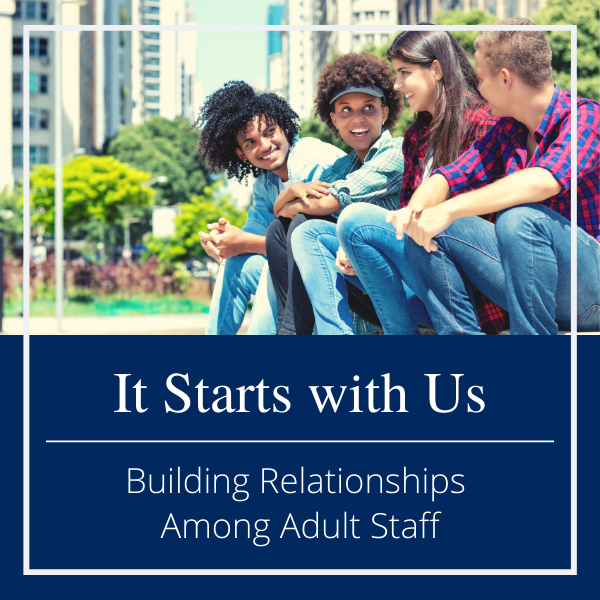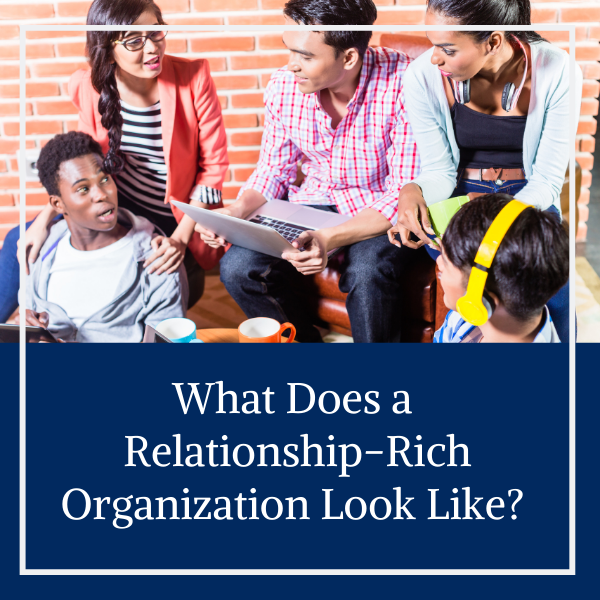Blog
Investing in Relationships: Supporting Structures Are the Bedrock of Relationship‑Rich Organizations

Investing in Relationships: Supporting Structures Are the Bedrock of Relationship‑Rich Organizations
How does a youth-serving organization ensure that every young person, no matter what their challenges or background, has the support and relationships they need to thrive?
Individual teachers and other practitioners working with youth in classrooms and programs need supporting structures to amplify and sustain their efforts to build great relationships.
That happens when organizations are investing in relationships by prioritizing and making space for relationship-building.
A study on the landscape of relationships in schools and out-of-school time (OST) programs shows the importance of supporting structures, such as hiring practices and internal communications, that form a relationship-rich culture.
The Rooted in Relationships Model
The Rooted in Relationships Model is based on decades of research demonstrating the importance of surrounding young people with a strong web of developmental relationships that are critical to their growth, learning, and success.
This web includes teachers, program leaders, peers, families, mentors and other adults who are committed to young people’s growth and success.
Even when they are aware of the importance of relationship-building, people who work with youth often report that they have inadequate time and resources to work on relationship-building with young people.
The Rooted in Relationships model uses the metaphor of a Ginkgo tree, a resilient species that can thrive even in harsh conditions.
-
The tree represents a healthy and thriving young person
-
The roots are developmental relationships with peers, teachers, coaches, staff, and anyone who offers connection, stability, encouragement and guidance.
-
The soil is the relational climate — soil conditions are critical for strong youth-adult relationships to take root.
-
The bedrock is the supportive structures that provide a foundation for the soil and all that grows within it: communications, staff hiring and retention practices, budget allocations.
-
The air, sunshine, wind, and rain provide the community context. Youth-serving organizations are affected by societal norms, government policies, and other aspects of the broader community context.
We want to further examine the supporting structures, the bedrock that provides a foundation for a relationship-rich organization.
Supporting Structures—Intention vs. Action
“I think sometimes leaders are above, they have this vision of how things are supposed to go and like, ‘If we do this, of course, we’ve got built‑in time for relationship‑building.’ ... of course, that’s our intention, but there's so many other things that have to get done. And so, I think, that there can be a disconnect sometimes between staff and leadership.” —School staff member, Greater Minnesota
The State of Relationships Study, which surveyed 668 school and OST program leaders and staff in Minnesota between February and June 2021, showed that an overwhelming majority of staff and leaders say that they’re invested in relationships.
But a gap exists between the vision and intention for building positive relationships with young people and the infrastructure staff and leaders feel they need to create relationship-rich spaces.
Here are some key findings from the study.
-
Mission, Vision, and Communication. Eight in 10 (82%) of staff and leaders said rhetorical support is present for strong youth-adult relationships.
-
Recognition. Only a bare majority (56%) of staff and leaders said relationship-building was recognized and rewarded.
-
Recruitment and Hiring. Two-thirds of the people surveyed (64%) said recruitment and hiring practices emphasize building positive relationships with youth.
-
Time Allocation. Only two-thirds of respondents felt their organization made adequate time available for building positive relationships with youth.
-
Program Content and Structure. 67% of respondents reported that the structure of their organization made it easy for staff to build positive relationships. 56% felt structures made it easy for youth to build positive relationships with staff, and 65% felt structures were in place for youth to build positive relationships with their peers.
That nearly 40% of these staff and leaders did not find enough support to do their most important work is concerning.
Clearly, there’s room for improvement.
Professional Learning for Relationship‑Building
Professional learning opportunities — workshops, conferences, mentoring, directed reading, or video-based training — are excellent ways to strengthen staff members’ skills and capacity to form strong relationships with young people. In the State of Relationships case study, staff reported on the learning opportunities they experienced, and whether those opportunities focused on relationship-building.
The results were mixed.
-
59% reported having access to professional learning on how to form relationships with youth who are difficult to engage.
-
61% participated in professional learning that helped them learn how to reflect on their relationships with youth and identify ways to improve those relationships.
-
75% reported that they had learned how to build positive relationships with youth so that they feel seen, known, and valued.
These numbers also indicate that schools and OST programs can better invest time and resources in professional learning opportunities that prioritize relationship-building.
Barriers to Building Strong Relationships—We Need Time
The State of Relationships case study also identified a number of barriers to developing strong relationships. The top barrier for staff and leaders was lack of time. Forty-three percent reported that there was a lack of time specifically dedicated to building relationships with youth.
Given that strong developmental relationships are a foundation for young people’s success, this seems like an investment that all youth-serving organizations should consider.
Building on Bedrock
Supporting structures are key to building a strong web of relationships for young people to connect, learn, grow, and develop the resilience that helps them succeed in life.
The State of Relationships case study shows that most staff and leaders know what needs to be done to build strong relationships. But they need the time, resources, hiring, training, and recognition to make that vision a reality.




